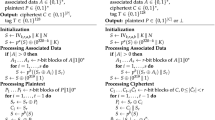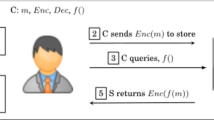Abstract
Without revealing data in the plain, public key encryption with equality test can achieve the basic cryptographic functionalities required. However, the extended version, i.e., public encryption with filtered equality test (PKE-FET) can be used to only test the ciphertext only for some data. In this paper, we revisit the notion of PKE-FET on various security models. We provide a formal definition for the security of PKE-FET and present a new scheme to achieve a stronger level of security than the existing scheme.

Similar content being viewed by others
Notes
Assuming there are basketball, Lakers, and Los Angles under w. So, only the equality test of FCS only works with ciphertext of each of them.
References
Baek J., Safavi-Naini R., Susilo W.: Public key encryption with keyword search revisited. In Proceedings of the International Conference on Computational Science and Its Applications, pp. 1249–1259. Springer (2008).
Bellare M., Boldyreva A., Micali S.: Public-key encryption in a multi-user setting: security proofs and improvements. In: Proceedings of the International Conference on the Theory and Applications of Cryptographic Techniques, pp. 259–274. Springer (2000).
Boneh D., Di Crescenzo G., Ostrovsky R., Persiano G.: Public key encryption with keyword search. In: Proceedings of the International Conference on the Theory and Applications of Cryptographic Techniques, pp. 506–522. Springer (2004).
Boneh D.: The decision Diffie–Hellman problem. In: Proceedings of the International Algorithmic Number Theory Symposium, pp. 48–63. Springer (1998).
Boneh D., Franklin M.: Identity-based encryption from the weil pairing. In: Proceedings of the Annual International Cryptology Conference, pp. 213–229. Springer (2001).
Boneh D., Waters B.: Conjunctive, subset, and range queries on encrypted data. In: Proceedings of the Theory of Cryptography Conference, pp. 535–554. Springer (2007).
Buccafurri F., Lax G., Sahu R.A., Saraswat V.: Practical and secure integrated pke+ peks with keyword privacy. In: Proceedings of the 2015 12th International Joint Conference on e-Business and Telecommunications (ICETE), vol. 4, pp. 448–453. IEEE (2015).
Chatterjee S., Menezes A.: On cryptographic protocols employing asymmetric pairings—the role of \(\psi \) revisited. Discret. Appl. Math. 159(13), 1311–1322 (2011).
Chen Y.-C.: Speks: secure server-designation public key encryption with keyword search against keyword guessing attacks. Comput. J. 58(4), 922–933 (2014).
Dittmann J., Lang A., Steinebach M., Katzenbeisser S.: Ecrypt-European network of excellence in cryptology, aspekte der sicherheit von mediendaten. In: Proceedings of the Sicherheit, pp. 89–192 (2005).
Fouque P.-A., Joux A., Mavromati C.: Multi-user collisions: applications to discrete logarithm, even-mansour and prince. In: Proceedings of the International Conference on the Theory and Application of Cryptology and Information Security, pp. 420–438. Springer (2014).
Huang K., Tso R., Chen Y.-C., Li W., Sun H.-M.: A new public key encryption with equality test. In: Proceedings of the International Conference on Network and System Security, pp. 550–557. Springer (2015).
Huang K., Tso R., Chen Y.-C., Mizanur S.M., Rahman A.A., Alamri A.: Pke-aet: public key encryption with authorized equality test. Comput. J. 58(10), 2686–2697 (2015).
Huang K., Tso R., Chen Y.-C.: Somewhat semantic secure public key encryption with filtered-equality-test in the standard model and its extension to searchable encryption. J. Comput. Syst. Sci. 89, 400–409 (2017).
Ma S.: Identity-based encryption with outsourced equality test in cloud computing. Inf. Sci. 328, 389–402 (2016).
Ma S., Huang Q., Zhang M., Yang B.: Efficient public key encryption with equality test supporting flexible authorization. IEEE Trans. Inf. Forensic Secur. 10(3), 458–470 (2014).
Ma S., Zhang M., Huang Q., Yang B.: Public key encryption with delegated equality test in a multi-user setting. Comput. J. 58(4), 986–1002 (2015).
Ming Y., Wang E.: Identity-based encryption with filtered equality test for smart city applications. Sensors 19(14), 3046 (2019).
Park D.J., Kim K., Lee P.J.: Public key encryption with conjunctive field keyword search. In: Proceedings of the International Workshop on Information Security Applications, pp. 73–86. Springer (2004).
Peng K., Boyd C., Dawson E., Lee B.: Ciphertext comparison, a new solution to the millionaire problem. In: Proceedings of the International Conference on Information and Communications Security, pp. 84–96. Springer (2005).
Shamir A.: How to share a secret. Commun. ACM 22(11), 612–613 (1979).
Tang Q.: Public key encryption schemes supporting equality test with authorisation of different granularity. Int. J. Appl. Cryptogr. 2(4), 304–321 (2012).
Tang Q.: Public key encryption supporting plaintext equality test and user-specified authorization. Secur. Commun. Netw. 5(12), 1351–1362 (2012).
Yang G., Tan C.H., Huang Q., Wong D.S.: Probabilistic public key encryption with equality test. In: Proceedings of the Cryptographers’ Track at the RSA Conference, pp. 119–131. Springer (2010).
Acknowledgements
The authors would like to thank the anonymous reviewers for their comments that helped to improve the presentation of the paper, and acknowledge Wordvice for editing this manuscript. In particular, the authors sincerely thank Kaibin Huang (TBCASoft) for initial discussions.
Author information
Authors and Affiliations
Corresponding author
Additional information
Communicated by K. Matsuura.
Publisher's Note
Springer Nature remains neutral with regard to jurisdictional claims in published maps and institutional affiliations.
This work supported in part by the Innovation Center for Big-Data and Digital Convergence, Yuan Ze University, and Ministry of Science and Technology of Taiwan, under Grants MOST 106-2218-E-155-008-MY3, 109-2628-E-155-001-MY3, 110-2218-E-004-001-MBK.
Rights and permissions
About this article
Cite this article
Chen, YC., Xie, X., Tsao, HY. et al. Public key encryption with filtered equality test revisited. Des. Codes Cryptogr. 89, 2357–2372 (2021). https://doi.org/10.1007/s10623-021-00924-1
Received:
Revised:
Accepted:
Published:
Issue Date:
DOI: https://doi.org/10.1007/s10623-021-00924-1




